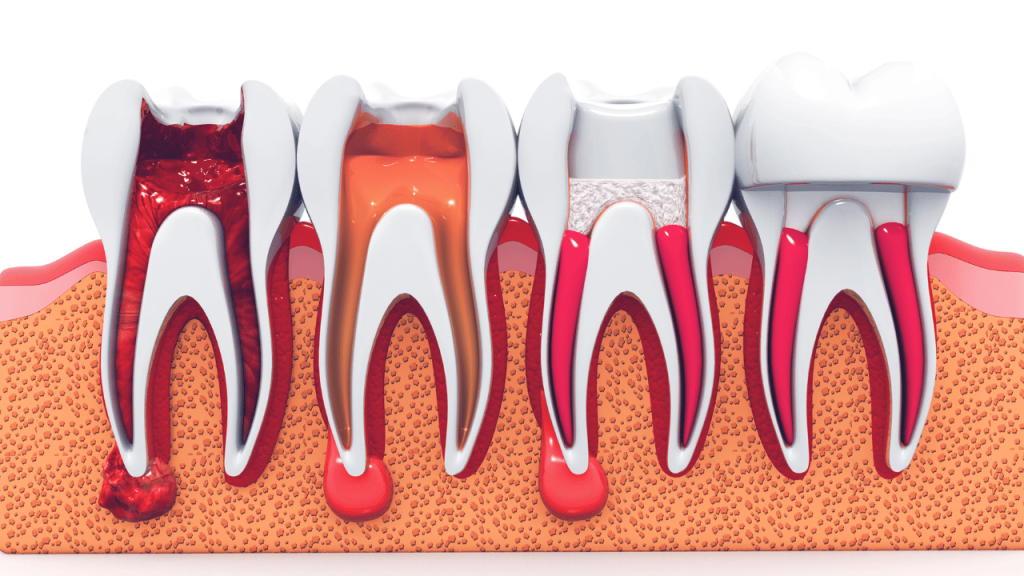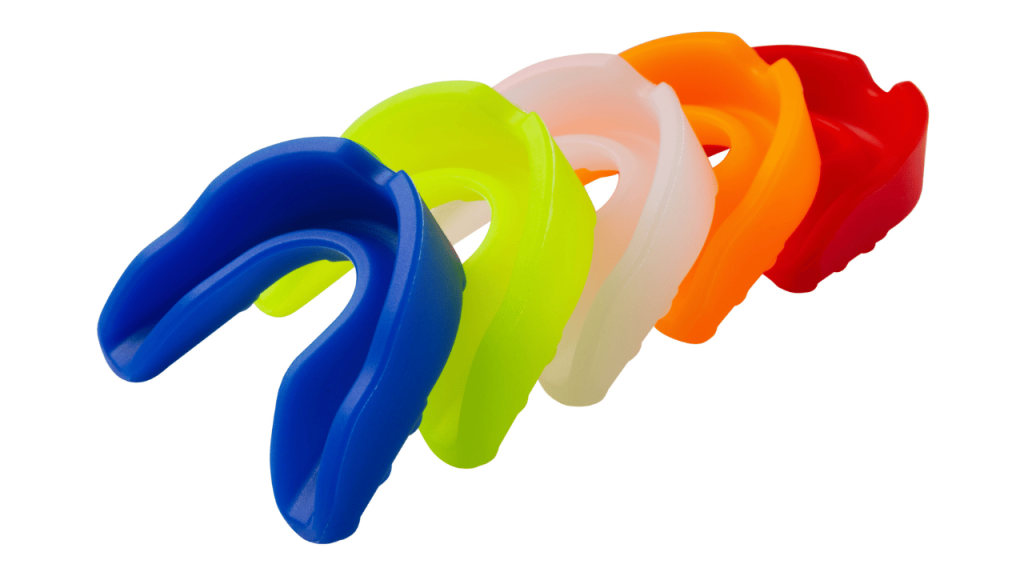
Maintaining good oral hygiene is the key to avoiding root canal procedures. Root canal treatments are standard dental procedures that treat infections in the tooth pulp. However, they can be avoided with proper dental care. With over a decade of experience as a dentist, emphasizes the importance of preventive measures to maintain oral health.
Key Takeaways
- Brush twice daily, floss once daily, and take care of your tongue to maintain oral health.
- To keep your teeth healthy, increase your water intake, restrict acidic foods and beverages, and refrain from consuming hard or sticky foods.
- Wear a mouth guard [1] and have regular dental checkups to prevent injury and detect dental issues early.
Brush Twice Daily
Brushing your teeth twice daily is one of the most effective ways to avoid a root canal.
To get the most out of your brushing routine, it’s essential to use the right toothpaste. Choose a fluoride toothpaste, as it protects against cavities [2] and tooth decay [3]. According to the American Dental Association, fluoride toothpaste has been shown to reduce cavities in both children and adults.
When brushing, use a soft-bristled toothbrush to cover all tooth surfaces for at least two minutes. Use a timer or play a song to ensure you brush for the full two minutes.
Remember to floss daily to reduce the risk of decay and infection between your teeth.
Floss Once a Day
Flossing is essential for good oral hygiene, preventing tooth decay and gum disease.
Flossing once a day is recommended to keep your teeth and gums healthy. It’s essential to use the correct flossing method to ensure thorough cleaning. Here are some techniques for effective flossing:
- Remember to use about 18 inches of floss, winding most of it around one middle finger and the rest around the other finger.
- Hold the dental floss firmly using your thumbs and forefingers, then carefully slide it between your teeth using a gentle back-and-forth motion.
- Curve the floss around each tooth in a C shape and gently slide it under the gumline.
- Remember to use a fresh section of floss for each tooth and quadrant of your mouth.
Remember to floss daily to prevent tooth decay, cavities, and the need for a root canal. Regular dental checkups and cleanings are essential for maintaining good oral health.
Take Care of Your Tongue
Did you know bacteria can cling to your tongue, leading to plaque buildup and potential infections? Taking care of your tongue is an important part of maintaining good oral hygiene and avoiding root canal treatment.
Benefits of Tongue Cleaning
Cleaning your tongue reduces bacteria, potential infections, and bad breath while enhancing your sense of taste.
How to Clean Your Tongue
Remember to clean your tongue to remove bacteria and freshen your breath. Use a tongue scraper or toothbrush, and consider using mouthwash. Remember, tongue cleaning is in addition to, not a replacement for, brushing and flossing. Good oral hygiene can help prevent decay and infection, reducing the need for extensive dental treatment.
Drink More Water
Remember to drink water consistently during the day as it can support oral health and lower the chances of requiring a root canal.
It’s important to consider various factors such as age, gender, weight, and activity level when determining the recommended daily water intake. However, as a basic guideline, it’s advisable to consume a minimum of 8 cups (64 ounces) of water every day. This practice will contribute to keeping your body hydrated and maintaining good oral health.
Limit Acidic Foods and Drinks
Acidic foods and drinks can erode tooth enamel and cause cavities. Limiting acidic intake is important to maintain healthy teeth and avoid dental issues.
Impact of Acid on Teeth
Acidic substances can weaken tooth enamel, making teeth more susceptible to decay and cavities. Enamel is the outer layer of teeth that serves as a protective barrier. When consuming acidic foods and drinks, the enamel can erode, leaving teeth vulnerable to decay and cavities.
Acidic Items to Avoid
To minimize your intake of acidic foods and drinks, you must know what they are. Here are some everyday acidic items to avoid or reduce:
| Acidic Foods | Acidic Drinks |
|---|---|
| Citrus fruits | Soda |
| Tomatoes | Fruit juice |
| Pickles | Energy drinks |
| Vinegar-based dressings | Sports drinks |
| Sour candies | Wine |
Avoiding acidic foods and drinks and maintaining a healthy diet with fruits, vegetables, and dairy can protect tooth enamel and prevent tooth decay.
Avoid Chewing Hard or Sticky Foods
When avoiding root canals, one of the most important things to remember is to avoid hard and sticky foods. These foods have the potential to crack teeth and dislodge fillings, leading to further complications such as damaged teeth and even tooth loss. So, what are some of the risks associated with complex and sticky foods, and what are some safer dietary choices you can make?
Risks of Hard and Sticky Foods
Avoid hard foods like ice and hard candy, as they can damage teeth. Sticky foods like caramel and taffy can dislodge fillings and harm teeth.
Safer Dietary Choices
So, what are some alternatives to complex and sticky snacks that are teeth-friendly? Here are a few ideas:
- Soft fruits such as bananas, berries, and peaches
- Cooked vegetables such as carrots, squash, and sweet potatoes
- Soft cheeses such as brie and camembert
- Nuts that are not too hard, such as cashews and almonds
By making simple changes to your diet, such as avoiding hard and sticky foods, you can reduce the risk of needing a root canal and keep your smile healthy for years.
Wear a Mouth Guard at Night and While Playing Sports

Do you grind your teeth at night or play contact sports? If so, wearing a mouth guard can help protect your teeth from potential trauma and avoid needing a root canal.
Have Regular Dental Checkups
Regular dental appointments are essential for upkeeping good oral health and preventing the need for root canal treatment. Seeing your dentist twice a year can aid in early problem detection. At your appointment, your dentist will conduct a thorough examination of your teeth and gums, remove plaque and tartar buildup by cleaning your teeth, and address any concerns you may have. Routine dental checkups can help avoid extensive dental procedures, maintain good oral health, and enhance overall well-being.
Frequently Asked Questions
What are the best practices for maintaining oral hygiene to prevent a root canal?
Maintaining good oral hygiene is essential to prevent root canal treatment. Brush your teeth twice daily with fluoride toothpaste and floss daily to remove plaque and food particles that can cause tooth decay. Regular dental checkups and cleanings can help detect and prevent dental issues before they escalate and require root canal treatment. Also, avoid sugary and acidic foods, which can erode tooth enamel and cause cavities.
Can a tooth infection be cured without resorting to a root canal procedure?
Sometimes, a tooth infection can be cured without a root canal procedure. Antibiotics may be prescribed to treat the disease, and a dental filling or crown may be used to repair the damaged tooth. However, if the infection has spread to the tooth’s pulp, a root canal may be necessary to prevent further damage and pain.
What role do diet and nutrition play in preventing the need for a root canal?
A healthy diet and proper nutrition can help prevent the need for a root canal. Eating a balanced diet rich in calcium, phosphorus, and vitamin D can help strengthen teeth and bones, reducing the risk of tooth decay and damage. Drinking plenty of water can also help flush harmful bacteria and prevent dry mouth. This condition can increase the risk of tooth decay.
Are there any effective natural remedies to avoid root canal therapy?
While there are no proven natural remedies to prevent root canal treatments, some practices may help promote good oral health and to avoid tooth decay. These include oil pulling, salt water rinse, and chewing sugar-free gum after meals to stimulate saliva production and neutralize harmful acids.
How can early dental fillings contribute to avoiding a root canal later on?
Early dental fillings can help prevent the need for a root canal later on. When tooth decay is caught early, it can be treated with a simple filling, preventing the decay from spreading and causing further damage to the tooth’s pulp. Regular dental checkups and cleanings can help detect and treat tooth decay early, reducing the risk of needing a root canal.
What are the most common signs indicating a root canal could be avoided?
Some common signs that indicate a root canal could be avoided include tooth sensitivity to hot or cold temperatures, pain when biting or chewing, and swelling or tenderness in the gums. If you experience any of these symptoms, seeing your dentist as soon as possible is essential to prevent the condition from worsening and potentially requiring root canal treatment.

